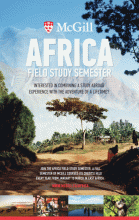| On this page: Medical form|Immunizations | Malaria prophylaxis | Other recommendations | More information |
Medical Form
It is important for us to know if any students have special medical needs so we can be prepared to assist in this regard.
The medical form should be completed and printed for your meeting with your physician. Your physician should also be provided with their own form to read and sign. Please send us a PDF copy of the physician form by email (saved under last name, first name, Physician-form) and keep the original copy.
If you are unable to access your usual physician to complete this form, it may be completed by another physician with the understanding that you are responsible to disclose any medical information that may impact on your participation in the program. These forms allow our program physician to adequately prepare the medical kit travelling with the program to deal with any medical emergencies that may occur. We do not reject students on the basis of their medical forms except in the case of an extreme ailment that may endanger the well-being of either the individual or other participants in the program.
Please be assured that Doctor-Patient confidentiality will be maintained both in Canada and in Africa and this includes your medical forms.
Immunizations
There are several immunizations required for travel to East Africa. Please consult your physician or a local travel medical clinic since the requirements do change from time to time.
The sooner you look after immunization requirements, the better. Sometimes appointments are needed for immunizations like Yellow Fever and it does take some time for the immunizations to be effective.
The following immunizations are required:
- Typhoid -
- Tetanus/Diphtheria/Polio - must be up to date
- Yellow fever - be sure to obtain a certificate for your immunization booklet
- Hepatitis A -
- Hepatitis B -
- COVID- (2 doses)
In addition the following may be recommended:
- Meningococcal Meningitis ACY and 135 - if you have had a meningitis vaccination in the past do not assume that it is the correct vaccination for travel.
- Dukoral - an oral vaccine for cholera that also reduces symptoms of traveler's diarrhea. Not required but highly recommended.
Malaria prophylaxis
In addition to the vaccinations, you must get a prescription for one of the following anti-malarial medications. Discuss which is best for you with your physician.
- Malarone- Daily - Expensive but effective and with minimal side effects
- Mefloquine - (Larium) taken weekly and for six weeks after travel. May have side effects of sleep disturbance, vivid dreams, anxiety and even psychosis
- Doxycycline - Daily - may cause yeast infections, diarrhea or sun sensitivity
We recommend Malarone unless there is some medical contraindication or the expense is prohibitive. Most supplementary medical plans provide partial coverage.
Other recommendations
Traveler's diarrhea is a common problem while on safari. You will be provided with treated, clean drinking water. Exposure through other means (shaking hands with locals, for example) is almost impossible to avoid. Careful hand washing prior to eating will be encouraged. It is also recommended that you bring along some Loperamide (Imodium) (available over the counter in Canada) and a few tablets of Ciprofloxacin (an antibiotic your doctor can prescribe to treat bacterial diarrhea).
Schistosomiasis (Bilharzia) is a parasitic infection which is caused by an organism that is common in fresh water lakes and rivers in Sub Saharan Africa. There is no way to be sure whether this parasite is present and so wading in rivers or swimming in any fresh water lakes will be discouraged. (Salt water is fine as are chemically treated pools.)
If you have any medical conditions that may require treatment while you are away, please bring along your usual medication. (Antihistamines for allergies, inhalers for Asthma, Birth Control pills etc.) We have a well stocked first aid kit but it is not a full pharmacy!
We tend to shake a lot of hands and pat a lot of kids' heads while in the field. Also, clean water is sometimes at a premium for washing hands frequently. For that reason, it is reasonable for you to bring along some hand sanitizer for your personal use.
We recommend that you have a good pair of running shoes to wear most of the time. Scorpions lurk under rocks in the field, mosquitoes like ankles and feet, other insects on the ground are a nuisance sometimes and often there are sharp dry sticks and thorns pointing up out of the parched earth. Snakes might be around. Sandals are comfortable but not protective enough for many of the situations we are in so running shoes are a more practical footwear choice for most of our excursions and camping locations.
Bring along a light weight long sleeved top and long pants to wear at dusk when malaria-carrying mosquitoes like to bite!
Sunburn can be a problem that makes travel uncomfortable. Be sure to bring along lots of sunscreen as it is very expensive in East Africa, and a hat of some sort.
More information
![]() Medical Advice for Students 2023
Medical Advice for Students 2023
To read more and keep up to date see the following links:
- Centers For Disease Control and Prevention - Travel Webpage
- Health Canada - Information for Travelers
- J.D. MacLean Centre for Tropical Diseases at McGill
- World Health Organization - International Travel Information
